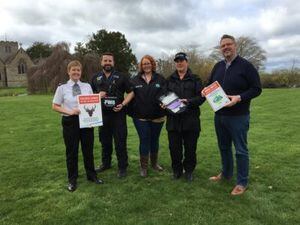Serious organised crime, poaching and equipment theft hitting rural areas
Serious organised crime, poaching and equipment theft are among the issues rural communities want West Mercia’s police and crime commissioner John Campion to tackle.

Now he has unveiled his plans to tackle rustling in the most rural areas as part of a new campaign aimed at helping communities in Shropshire and Wyre Forest feel connected, safer and less isolated.
Issues include theft of livestock, serious organised crime, illegal fishing and fly-tipping.
More than a third of communities in the force area are rural rising to 50 percent in Shropshire making the issue a top priority.
The new plan has been developed specifically to tackle crime in such areas following a consultation exercise which saw Mr Campion go out and about in villages and hamlets to talk to residents about what is happening in their area.
Findings in his Rural Crime Strategy include: "In 2018/19, 23 per cent of all police recorded crime in West Mercia occurred in a rural area.
"Across West Mercia’s rural areas in 2018/19 the most prevalent crime was ‘violence without injury’, accounting for 23 per cent of all crime. This was in line with West Mercia’s non rural areas.
"Organised criminality is increasingly being recognised as having an adverse impact on rural communities and wildlife
"The National Rural Crime Network’s (NRCN) 2018 rural crime survey identified ‘criminal damage or vandalism or arson’ as the most commonly experienced crime for most respondent types and ‘fly-tipping’ for rural specific businesses (farmers).
"Around one third of all crimes committed against NRCN survey participants were not reported to the police."
The report also stated that 34 people were killed on rural roads in West Mercia including Herefordshire in 2018/19.
Areas visited included Little Wenlock, in Shropshire, where the commissioner heard the concerns raised and he has set out his vision to reduce the crimes most likely to be experienced including farm and agricultural crime and wildlife crimes such as poaching.
Mr Campion said: “It is vital that we make sure voices and priorities are heard and acted on from within our rural areas, making sure that communities and individuals feel more connected.”
“We must understand their concerns and the unique challenges they bring to policing. I want rural communities to have the same efficient and effective service, regardless of where they are, and for them to be safe and feel safe.”





